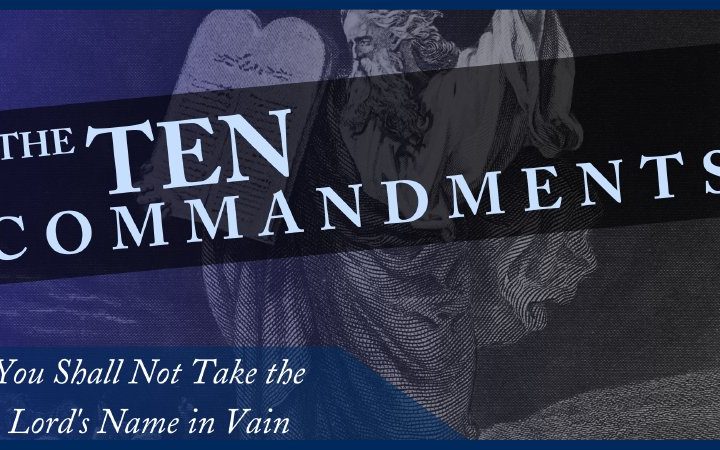Background
My six-year-old came running, “Daddy, daddy, my sister is being bad.” When I enquired about what the sister did, the older one said, “she is saying God’s name in vain.” So, I pressed further, “What exactly did she say?“ She answered,” “Oh my God.” I dismissed the issue by saying, “That’s not God’s name.”
I have no idea where my daughter got that lesson from, but it is pretty pervasive in our churches since the King James Bible gave us the following translation of Exodus 20:7,
Exodus 20:7 KJV
Thou shalt not take the name of the LORD thy God in vain; for the LORD will not hold him guiltless that taketh his name in vain.
There are scholarly debates on how to number the commands. Some scholars believe Exodus 20:7 is the second command in the Ten Commandments, also known as the Decalogue. In this piece, I shall stick with the common belief that it is the third Commandment.
In the West and everywhere Western missionaries have been and continue to have influence, the verse has been taken to mean things like the prohibition of profanity, false swearing in God’s name, breaking vows made to God, and a call to revere and respect God in worship and conversations. While these are all commendable, they are also all inadequate. They do not capture the point of Exodus 20:7 well. The various interpretations of the verse revealed a cloud of uncertainty in our understanding.
An Old Testament scholar, Carmen Imes, significantly enriched our understanding with her pivotal dissertation, later published as Bearing God’s Name. Part of the problem had been semantics. The Hebrew verb (nasa), translated as “taketh” in the KJV, can also mean carry, lift, lift up, raise, bring, exalt, and so on. The multiplicity of choices is a translator’s nightmare. Imes’ work begins to clear the cloud in her keen observation that the book of Exodus itself provides an interpretive grid for this knotty passage.
Exodus 28 is a chapter about details of the design of priestly garments, the sort of boring Bible passages that we have learned to skip but that scholars have learned to mine for pearls. Aaron would not be able to serve as a priest unless the garments were made to specifications, which included color, type, stone embroidery, and even who could fashion the different pieces of the costume. In the design of the priestly ephod, the specific kind of stones were to have the names of the tribes of Israel on them, six on each. The stones would then be sewn onto the ephod:
Exodus 28:11-12 NIVUK
[11] Engrave the names of the sons of Israel on the two stones the way a gem cutter engraves a seal. Then mount the stones in gold filigree settings [12] and fasten them on the shoulder pieces of the ephod as memorial stones for the sons of Israel. Aaron is to bear the names on his shoulders as a memorial before the LORD.
Notice how the idea of the last sentence is the same as the one in the third commandment. In fact, the same verb is used. Aaron would bear the names of the tribes of Israel before Yahweh. This idea is repeated two more times in the chapter. So, whereas older translators thought it strange that a name could be borne or carried, that is precisely what the third Commandment required. To bear God’s name is “to represent him well” (Imes, 51). But why and what does this mean?
The Why: Advertising God Appealingly
This is where reading narratively is essential. The story of the Bible opens with a creator creating all things and privileging humans in the acts. By Genesis 10, humans had done the opposite of what God desired. In Genesis 12, God renewed His project – which is still a continuation of the Adam Project – by calling Abram with the expressed goal of creating a people for Himself through Abram. It was as though God (temporarily) abandoned the other nations to do as they pleased. While we are today conditioned to think of Yahweh as the God of all creation and people, that was not the primary way that ancient Israelites thought about God. Yes, they affirmed that God created all things and people, but Yahweh was Israel’s God while the other nations had other, by definition, lesser gods ruling over them. That is the idea captured in the following verses:
Deuteronomy 6:4 ESV
“Hear, O Israel: The LORD our God, the LORD is one.
The English Standard Version says this verse can also be translated as “The LORD is our God, the LORD alone.” In other words, this verse does not teach that there are no other gods. On the contrary, the verse reminds the Israelite that there was only one God for them. Indeed, here are verses 13 and 14 of the same passage:
Deuteronomy 6:13-14 ESV
[13] It is the Lord your God you shall fear. Him you shall serve and by his name you shall swear. [14] You shall not go after other gods, the gods of the peoples who are around you.
So, quite clearly, the text recognizes that the nations around Israel had other gods they ran after.
Deuteronomy 7:6 ESV
“For you are a people holy to the Lord your God. The Lord your God has chosen you to be a people for his treasured possession, out of all the peoples who are on the face of the earth.
Exodus 19:5-6 ESV
[5] Now therefore, if you will indeed obey my voice and keep my covenant, you shall be my treasured possession among all peoples, for all the earth is mine; [6] and you shall be to me a kingdom of priests and a holy nation.’ These are the words that you shall speak to the people of Israel.”
Isaiah 24:15 ESV
Therefore in the east give glory to the Lord; in the coastlands of the sea, give glory to the name of the Lord, the God of Israel.
So, we see that God called Abram to produce a people who would then be moulded into a “kingdom of priests and a holy nation.” These people were to represent Yahweh well to their surrounding nations. This is why they were forbidden from intermarrying with the neighbors. The goal was not at all to keep the nations out – in fact, the ultimate goal was to bring the nations in. On the contrary, the goal of the laws was to keep Israel in. Like the ones before Israel, Yahweh knew the human tendency to wander. And the nation of Israel eventually did wander. Soon enough, the people who were to bear Yahweh’s name were not quite distinguishable from the neighbors. Indeed, they were exiled to the nations. But Yahweh did not have a plan B; a true Israelite would yet come from Abraham’s descendants, as we discussed in detail elsewhere.
The What: Name Theology
When ancient Israelites spoke of “the Name” (Hebrew: Ha-Shem), they were not primarily concerned about the letters that spell the divine name. Instead, “the name” was a circumlocutious means of referring to Yahweh himself. Consider the following:
Proverbs 18:10 ESV
The name of the LORD is a strong tower; the righteous man runs into it and is safe.
This well-known verse is not sanctioning a car-sticker theology. You can not run to a name, but you can run to a person. The point of this verse is that Yahweh saves and protects.
Isaiah 24:15 ESV
Therefore in the east give glory to the LORD in the coastlands of the sea, give glory to the name of the LORD, the God of Israel.
This is standard Hebrew poetic parallelism: “Give glory to the LORD” and “Give glory to the name of the LORD” are alternate ways of saying the same thing.
Isaiah 30:27 ESV
Behold, the name of the LORD comes from afar, burning with his anger, and in thick rising smoke; his lips are full of fury, and his tongue is like a devouring fire;
Names, literally, can do nothing; they certainly do not burn. The actor in this verse is a person, not a four-letter Hebrew word. Hence, “his lips are full of fury, and his tongue is like a devouring fire.”
Examples may be multiplied, but the point remains that a person is the referent of “the name” in these kinds of contexts. This may have been the beginning of a Jewish practice which continues in our time that avoids saying “YHWH” altogether. For the ancient Israelites and Jews, “the name” conjured up ideas of a specific deity.
Jesus and the Name
We have looked at various ways that Jesus is presented as Yahweh in other entries such as the one here. To keep that series from being longer than it already was, I did not include some other relevant ideas. We are now ready to add to the list of means by which the Bible shows Jesus to be Yahweh.
First, we should observe that the circumlocutory use of “name” continues in the New Testament but with a major twist. John writes:
John 20:30-31 ESV
[30] Now Jesus did many other signs in the presence of the disciples, which are not written in this book; [31] but these are written so that you may believe that Jesus is the Christ, the Son of God, and that by believing you may have life in his name.
Once again, “have life in his name” means “have life in Jesus.” The name is the person. The life in question does not derive from the particular spelling of a name. That is why “the name” of Jesus remains just as powerful in any language. The particular spelling – Yeshua, Jésù, Jesus, Yesu, Ιsa, Ιησούς – does not matter as much as the referent of the word.
The remarkable observation is that whereas the circumlocutious use is for Yahweh in the Hebrew Bible, New Testament writers had no expressed concerns about doing the same for Jesus whom they claimed was crucified under Pilate by Roman soldiers. Might they have thought that the crucified man was somehow also Yahweh? Yes, indeed. Perhaps, even more remarkable is that this idea is noticeable very early in the life of the church.
Consider the Pentecost speech of Peter, the foremost Apostle of the nascent church. After the Holy Spirit invaded the hearts of women and men in Acts 2 – an act that effectively communicated a reversal of the divine intervention at Babel – Peter had to explain the phenomenon to the confused crowds. He thought the prophet Joel had the answer, and Peter proceeded to quote him. The quote ends with this:
Acts 2:21 ESV
And it shall come to pass that everyone who calls upon the name of the Lord shall be saved.’
However, in Joel 2:32, which Peter cites in the verse above, “the Lord” (Greek, kyrios) is “Yahweh.” So, Joel says whoever calls on (the name of) Yahweh shall be saved. That is, Yahweh is the one who saves, the savior of humankind. Two chapters later in Acts, Peter has this to say:
Acts 4:11-12 ESV
[11] This Jesus is the stone that was rejected by you, the builders, which has become the cornerstone. [12] And there is salvation in no one else, for there is no other name under heaven given among men by which we must be saved.”
Peter, a Jew speaking to other Jews, says there is no salvation in anyone else, and no other name can save. However, he had earlier agreed with the prophet Joel that it is Yahweh who saves. So, what could he mean by “no other name…by which we must be saved”? What happened to “Yahweh,” a well-known name that saves? This all makes sense only if Peter had collapsed the identities of Jesus and Yahweh. That is, Jesus, for Peter, is Yahweh. Imes sums it up nicely: “The salvation available only to those who called on Joel’s kyrios, Yahweh, is now found exclusively in Peter’s kyrios, Jesus. Peter is convinced that Jesus of Nazareth is Yahweh in the flesh” (152).
Apostle Paul also demonstrated awareness of Jesus’ divinity. In a well-known but often misunderstood poem, Paul explicitly wrote that Jesus is “the name” – an idea that an informed Jew could not have misunderstood:
Philippians 2:9-11 ESV
[9] Therefore God has highly exalted him and bestowed on him the name that is above every name, [10] so that at the name of Jesus every knee should bow, in heaven and on earth and under the earth, [11] and every tongue confess that Jesus Christ is Lord, to the glory of God the Father.
Obviously, “the name above every name” is not “Jesus.” The name “Jesus” is like “Bello” in some parts of Nigeria or “Robert” in America. It is a variant of “Joshua,” and many Jews bore the name. You know the name no Jew bore? That is right, “Yahweh.” The name that is above every name is Yahweh. So, the point Paul here makes then is that the man Jesus became entitled to answering to “Yahweh” so that at the mention of the name Jesus, Yahweh is addressed. Yet, like Peter, Paul distinguishes between Jesus Christ and God the Father.
The examples can be easily multiplied, but I must wrap up this entry before it becomes book-length. The lesson is that perhaps the most misunderstood of the Commandments has far-reaching theological importance. Every human inherently has the capacity to radiate God in that she is made in God’s image. However, the fine details and quality of the image were distorted, even though she retains the form and capacity. The one described as the “exact imprint” of God’s nature (Hebrews 1:3) and “the image of the invisible God” (Colossians 1:15) – that is, one who makes God visible – has made it possible again for all humans to bear God’s name well. We shall not carry the Lord’s name in vain because it is God’s primary means of wooing the world to himself. He has committed himself to using humans to achieve his goal of inheriting the nations, and we are ineffective and misleading when we misrepresent him. Just as Yahweh said to ancient Israelites, Peter could speak to the whole church now:
1 Peter 2:9 ESV
But you are a chosen race, a royal priesthood, a holy nation, a people for his own possession, that you may proclaim the excellencies of him who called you out of darkness into his marvelous light.
The goal and assignment have not changed. The church, which includes Jews and Gentiles, now bear God’s name to the world. This is what the resurrected Jesus says about Paul to Ananias:
Acts 9:15 ESV
But the Lord said to him, “Go, for he is a chosen instrument of mine to carry my name before the Gentiles and kings and the children of Israel.
This is yet another subtle way of portraying Jesus as Yahweh. Paul would go into the world preaching in the name of Jesus, not Yahweh, because, as Maui said to Moana, it is the “same difference” – a distinction without a difference.
Work Cited
Imes, Carmen Joy. Bearing God’s Name: Why Sinai Still Matters. IVP Academic, 2019.





1 Comment